Questions on constitutional relations and government businesspublished at 14:00 BST 26 September 2018
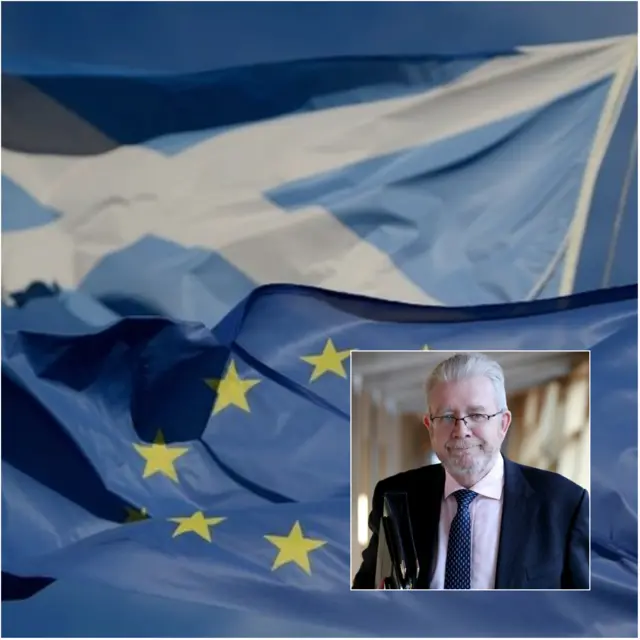 Image source, Getty/PA
Image source, Getty/PAThe rural economy committee undertakes pre-budget scrutiny, focusing on ferries
Constitutional relations, culture, tourism and external affairs ministers are up for portfolio questions
A statement will be made on the common agricultural policy
Followed by another statement on social security
MSPs debate supporting and protecting human rights defenders
The member's business focuses on Euratom
Craig Hutchison and Louise Wilson
 Image source, Getty/PA
Image source, Getty/PAAfter lunch, portfolio questions will see constitutional relations and culture, tourism and external affairs in the spotlight.
Rural Economy Secretary Fergus Ewing will then give ministerial statement on the Common Agricultural Policy.
 Image source, GettyImages/SPl
Image source, GettyImages/SPlTwo ministerial statements this avo: One on CAP and the other on Scotland's social security system
Another ministerial statement is next, this time entitled “Dignity and Respect in Scotland’s Social Security System”.
The debate in the chamber is led by the government and is on supporting and protecting human rights defenders.
Labour MSP David Stewart will lead a member’s debate on the impact of leaving Euratom.
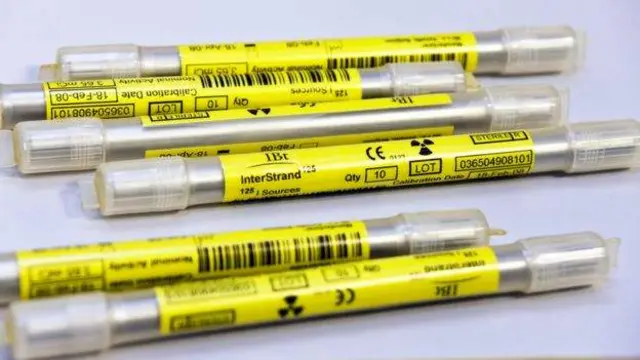 Image source, SPL
Image source, SPLMSPs will debate the impact of Euratom this evening
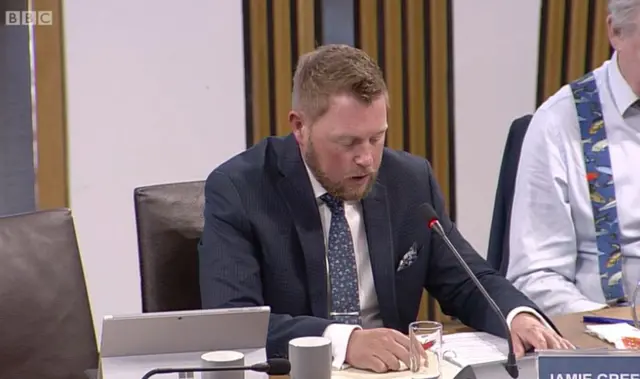
Tory MSP Jamie Greene
Tory MSP Jamie Greene asks about the tendering process for the routes.
Roy Pedersen says the present tendering system is restrictive, in that the incoming operator is expected to have the same crew, ships and fares.
There is no scope for innovation in that, Mr Pedersen adds.
Ranald Robertson says Hitrans has been "broadly agnostic" on the matter.
Angus Campbell says the CalMac Community Board has not discussed it, but suggests some form of benchmarking would be helpful.
He expresses concern than smaller route bundles would allow cherry picking of the most popular routes.
Rob McKinnon says there is a strong affinity with CalMac but there are frustrations with the service.
That concludes today's session.
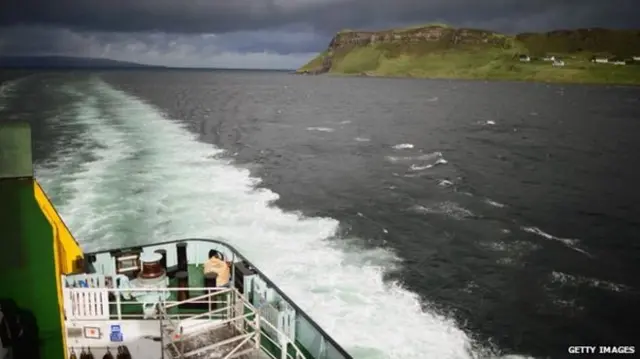 Image source, Getty Images
Image source, Getty ImagesSNP MSP John Mason asks if the fares are just too cheap.
Angus Campbell of CalMac Community Board replies: "People living on the islands would say they are not too cheap."
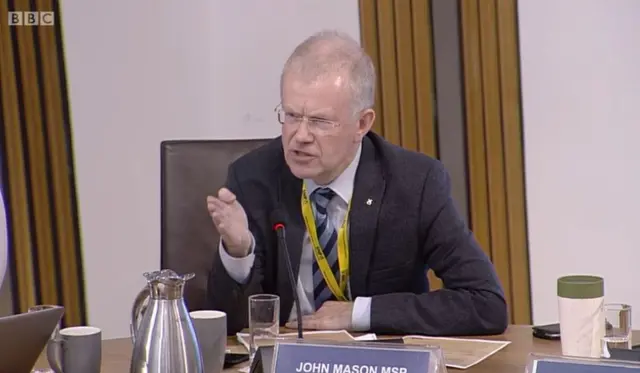
SNP MSP John Mason
SNP MSP John Mason asks about RET.
Roy Pedersen says RET was an idea of its time and there is now scope to reconsider it, for example looking at peak and off-peak times.
He notes recent discussions on tourist taxes and suggests tourists should not both be subject to this while also benefiting from RET too.
Ranald Robertson says RET has done a tremendous job of increasing the desire to travel to the islands and allowed people from the islands to travel.
However, he argues it is not consistent as some islanders have more access to RET than others.
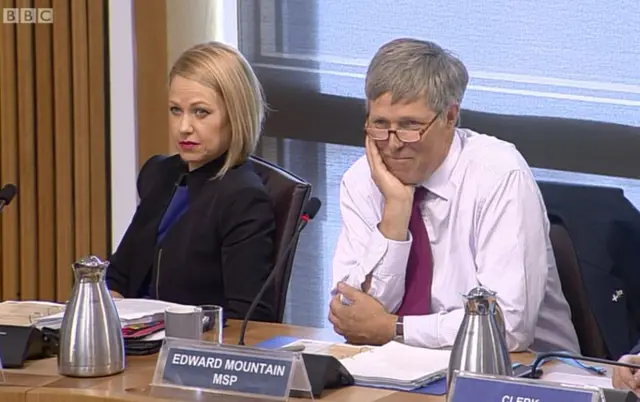
SNP MSP Gail Ross and committee convener Edward Mountain
SNP MSP Gail Ross asks if the witnesses think sufficient consideration is given to those with disabilities in port design.
Rob McKinnon from Outer Hebrides Tourism insists the approach of the operators is great.
Mr McKinnon says considerations around accessibility are being taken into account.
Ranald Robertson suggests the operator does a tremendous job helping those with mobility issues.
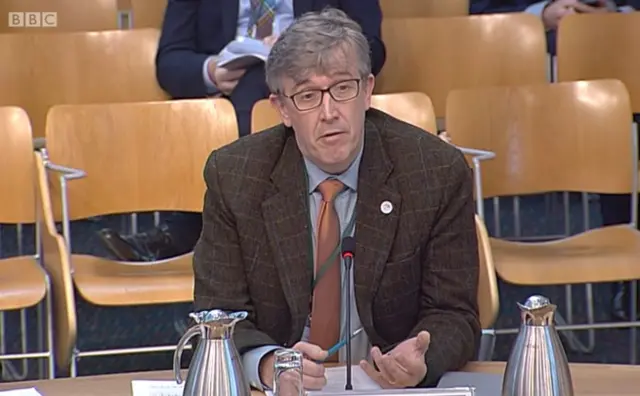
Rob McKinnon from Outer Hebrides Tourism
Labour MSP Colin Smyth asks about ports in need of specific investment.
Rob McKinnon from Outer Hebrides Tourism says across the Sound of Harris is under pressure, a route which is vital to tourism in the area.
Convener Edward Mountain asks about the pressure added by camper vans.
Roy Pedersen says camper vans should not be subsidised by the Road Equivalent Tariff because they do no contribute to the local economy as much.
Angus Campbell of the CalMac Community Board disagrees, saying such an approach would hit the poorest people hardest and it would also impact those from the islands going to the mainland in their camper vans.
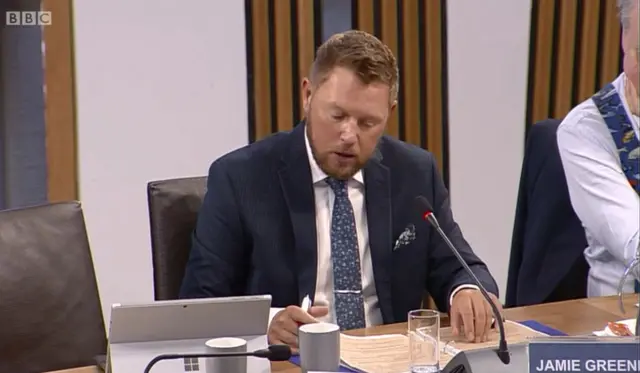 Image source, bbc
Image source, bbcTory MSP Jamie Greene
Ranald Robertson says it is right and proper that the Scottish government looks at ferry services as a whole.
Mr Robertson insists there is a shared sense of purpose to deal with the changing demand.
Tory MSP Jamie Greene posits that there is something flawed in the way things are operating.
He cites there are private companies out there which could be used and he asks if there is another way of looking at this.
Roy Pedersen points to the Scandanavian model which provides the service in a cost efficient manner.
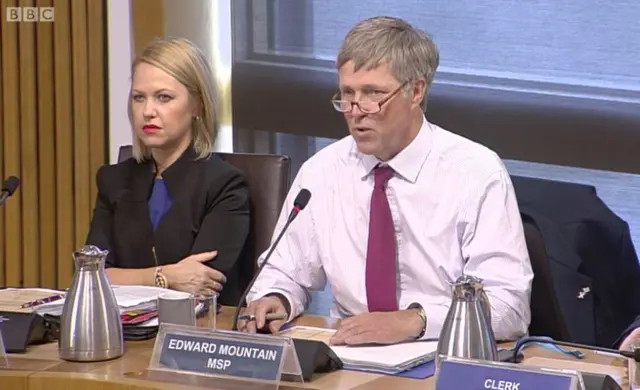
Convener Edward Mountain
There is broad support for smaller, more frequent services insists Rob McKinnon from Outer Hebrides Tourism.
Convener Edward Mountain asks if the panel agrees with the existing ferries plan.
New developments have superseded it says Angus Campbell of the CalMac Communities Board, and he calls for a new plan.
Roy Pedersen says there is a case for a new management structure for ferries.
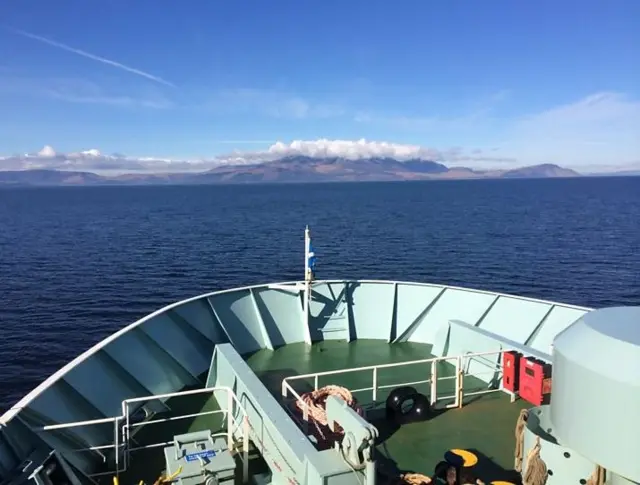 Image source, bbc
Image source, bbcArran from the ferry
Ranald Robertson from Highland and Islands Transport Partnership (Hitrans) tells the chamber: "You cannot do a day trip from the Western Isles to the mainland."
Angus Campbell of CalMac Community Board says we might have to look at new ways to raise finance, citing other countries which have publicly owned ferry services.
Mr Campbell adds: "No long term plan is any use if you don't have the finances behind it."
Ranald Robertson insists communities must be heard and he calls for appraisal of services going forward.
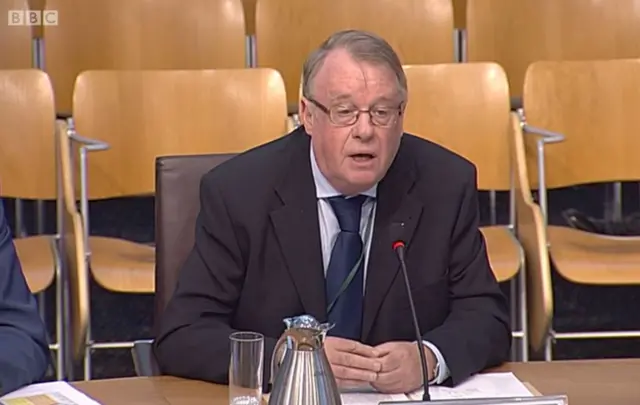
It's not too late to move to a two ship scenario on the Skye triangle, insists Roy Pederson.
He suggests the new ships be deployed somewhere else, for example on the Scrabster-Stromness route.
Two ships would provide a far superior service than one ship, he insists, leading to more revenue and in the long-term resulting in lower costs overall.
Ranald McKinnon from Hitrans agrees a single vessel does not feel like the right option.
We need to plan for the next 20-30 years and look at capacity to Mill, Islay and the Little Inch.
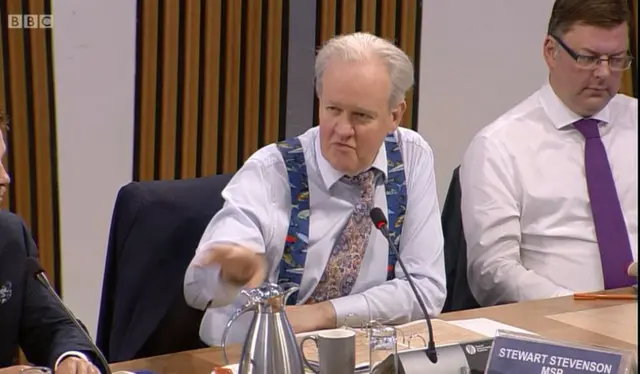 Image source, bbc
Image source, bbcSNP MSP Stewart Stevenson
Ranald Robertson from Highland and Islands Transport Partnership (Hitrans) says not enough people in the Western Isles are involved in the delivery of the ferry service.
SNP MSP Stewart Stevenson pivots to integration of transport links.
Angus Campbell of CalMac Community Board says it is a common feedback the onward links do not match with the ferries.
There has been improvements in this area, but more needs to be done, syas Mr Campbell.
He reiterates there is constantly an ask for better connections.
Allow X content?
This article contains content provided by X. We ask for your permission before anything is loaded, as they may be using cookies and other technologies. You may want to read X’s cookie policy, external and privacy policy, external before accepting. To view this content choose ‘accept and continue’.
Allow X content?
This article contains content provided by X. We ask for your permission before anything is loaded, as they may be using cookies and other technologies. You may want to read X’s cookie policy, external and privacy policy, external before accepting. To view this content choose ‘accept and continue’.
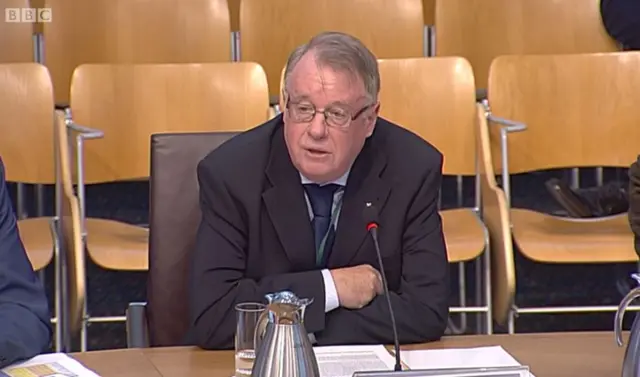
Roy Pedersen says it is important that the terms and conditions for staff meet best practice and he also calls for crews to be made up of people based on the islands.
He suggests this would also help to increase the population and improve economic activity on the islands.
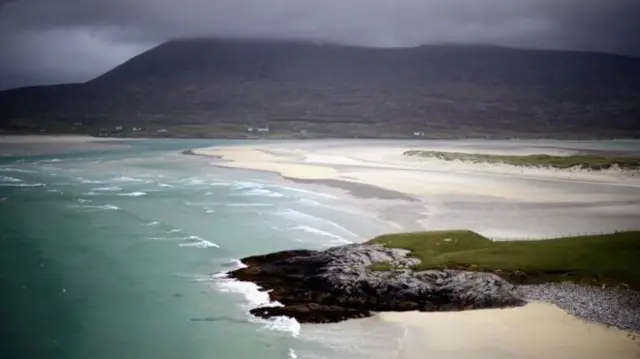 Image source, Getty Images
Image source, Getty ImagesTourists who have booked holidays at short notice to the Western Isles can face difficulties getting there by ferry, a tourism group has said.
Outer Hebrides Tourism said ferry operator Caledonian MacBrayne was doing the best it could to meet increased demand with the resources available.
It has called on Transport Scotland to help CalMac by investing more in it.
Transport Scotland said it was aware of capacity challenges at peak times on CalMac's Clyde and Hebrides network.
It also said that more than £1bn had been invested in the services since 2007.
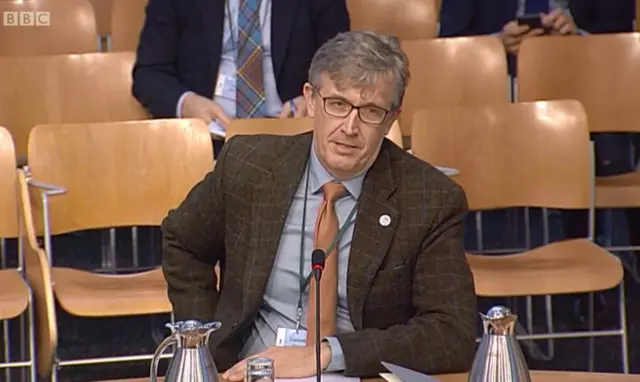 Image source, bbc
Image source, bbcRob McKinnon from Outer Hebrides Tourism
Ranald Robertson from Highland and Islands Transport Partnership (hitrans) says he was enormously encouraged by earlier evidence session.
However some of the recent decisions are not the ones he would have welcomed.
Mr Robertson says routes to the Western Isles will be in the high seventies, which means some people can not get the ferries they wish.
Rob McKinnon from Outer Hebrides Tourism explains there is no incentive for growth at the moment.
Mr McKinnon explains there is lot of community support for a small two boat service, but in both cases there has been one larger vessel delivered.
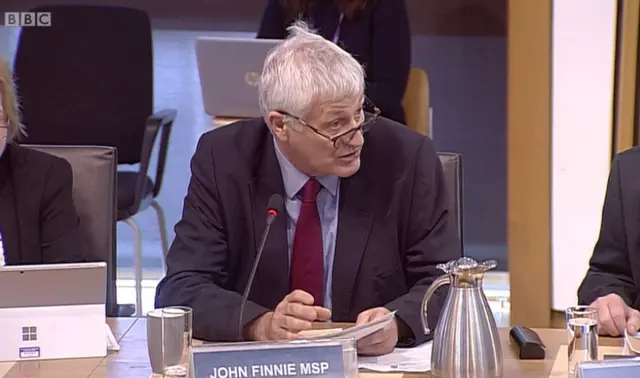
Green MSP John Finnie
Green MSP John Finnie again asks about the resilience of services for the islands.
Angus Campbell of the CalMac Community Board says the most consistent feedback they have received is that the level of investment has been inadequate.
Communities are questioning whether there views are properly included at the planning stage, he adds.
Consultant Roy Pedersen says the funding of the system compares unfavourably with elsewhere, both internationally and even in other parts of Scotland.
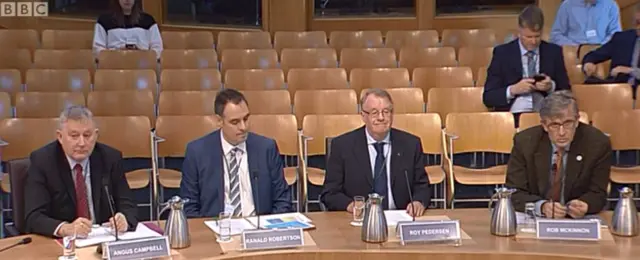 Image source, bbc
Image source, bbcThe second panel comprises:
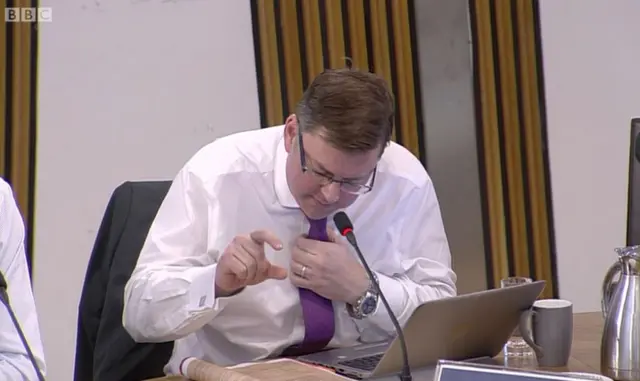
Labour MSP Colin Smyth
Harbour improvement works are raised by Labour MSP Colin Smyth, who asks about additional support from Transport Scotland for this.
Mr Hobbs confirms CMAL puts in bids for funding, some of which are successful and some of which are not.
He concedes any port investment is expensive and takes time.
We have a number of ports within five years of life expiry and discussions with Transport Scotland are ongoing, Mr Hobbs tells members.
Robbie Drummond highlights the importance of ports being fit for purpose.
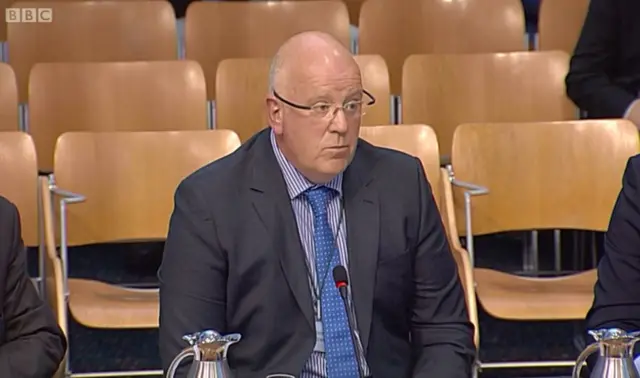 Image source, bbc
Image source, bbcKevin Hobbs from Caledonian Maritime Assets (CMAL)
Tory MSP Jamie Greene asks when CMAL were first advised by Ferguson Marine that there were difficulties and overruns with the delivery of hulls 801 and 802 and they would go over the £97m budget.
Kevin Hobbs from Caledonian Maritime Assets (CMAL) say he was advised in July 2017 that there were cost overruns and because CMAL has a team embedded with Ferguson they were already aware of issues.
Mr Hobbs reiterates it was known from stage one it was a fixed term contract and Ferguson signed up to the contract and.
He insists: "£97m is what we have to pay."
We judge that it will cost a lot more and that is not our problem, it is the problem of the private company, Mr Hobbs explains.